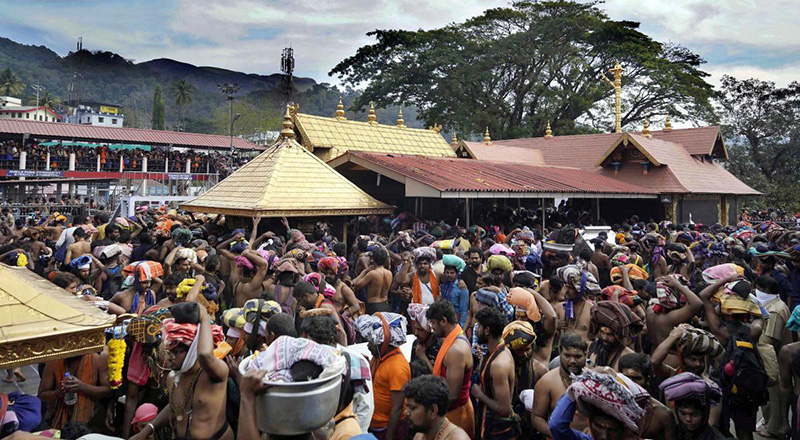Guide To Piligrims
The Travel Kit
Nov 2014

If we analyse the significance of the pilgrimage to the Sabari Hill in consonance with the nature of the austerities to be observed, it would appear to be symbolic of the journey of the soul to merge with the Supreme on its attainment of immortality. Even though it is only a symbol, the value of the pilgrimage cannot be gainsaid, for it is only by a faithful and constant repetition of the symbolic pilgrimage that the truth of the real pilgrimage will dawn on us. The austerities are clearly expressive of “Sarvadharman parityajay.” Free as the soul is from the influence of this world of Maya, no dharmas of the world are, or can be, attached to it. The Lord of the universe presides there to receive all those who go to Him irrespective of the religion they profess, as is evident from the great number of non-Hindu pilgrims seen among the sea of humanity gathering there, and, what is more, right in front of the shrine there is the temple of Vavara, a Muslim, the first lieutenant of the Lord, standing as permanent monument to the Lord’s declaration of the equality of mankind. The austerities call for the performance of no religious rites but demand action, not outer symbolic action but action within the field of the human body.
In undertaking the pilgrimage, therefore, the austerities are the most important, since they constitute the foundation. It is on the intensity of their observance, the unassailable faith behind them and the transformation they bring about in our mental being, that the result of the pilgrimage depends. It is for knowledge, knowledge by experience, that we undertake the pilgrimage and, unless we surrender to Him and to His Will, without any reservation whatsoever, ignoring our individuality born of the ego, it would be nothing but hypocrisy. What purpose would it serve our presenting ourselves before the Lord of our being with mental reservations?
“Because people fall down before me only in words and honour me only with their tongue, while their heart is far off from me, and because their fear of me is only a human convention which they have learnt by rote, the wisdom of their wise shall be lost and the understanding of their tinkers shall be dimmed.”
A safe return after the pilgrimage, therefore, is not the criterion by which to judge its success. This is to be measured by the extent of the knowledge-by-experience that we have gained and will depend on the nature of the surrender and faith in which we undertake the pilgrimage. And to be successful we have to mould our being by observing the austerities faithfully and surrendering to Him all that we are. “As you sow, so do you reap”. The result is measured to us in proportion to the transformation we bring in our mental being by observance of the austerities.
